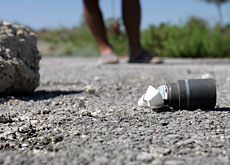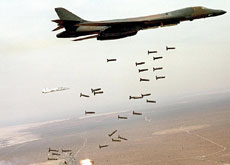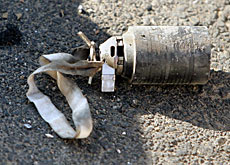Ban on cluster munitions moves one step closer

Forty-six nations including Switzerland have adopted a declaration in Oslo calling for a 2008 treaty banning cluster bombs.
Swiss officials praised the outcome of the two-day conference, saying it was a step in the right direction even though many major powers did not attend.
Of the 49 nations attending the conference in Norway, only Poland, Romania and Japan did not approve the final declaration, according to officials. The document urges nations to conclude a treaty outlawing cluster munitions.
It would “prohibit the use, production, transfer and stockpiling of those cluster munitions that cause unacceptable harm to civilians”, the declaration said.
“It is much in the vein of the declaration we presented [at a previous conference] in November in Geneva,” said the head of the Swiss delegation, Christine Schraner Burgener.
“It’s a good step forward that we have expressed the desire to have a legally binding international instrument.”
The gathering was snubbed however by some key arms makers, including the United States, Russia and China.
“We take the position that these munitions do have a place and a use in military inventories,” US spokesman Sean McCormack said.
Australia, Israel, India and Pakistan did not attend the meeting either. Those nations say the weapons should be dealt with in other arenas, such as the UN Convention on Conventional Weapons.
For Switzerland though, being present on all fronts is necessary.
“It was important to underline that this process does not mean that we will not take part in important discussions taking place at the convention on conventional weapons,” Schraner Burgener told swissinfo.
“This problem has to be discussed within the framework of international humanitarian law and at all relevant fora.”
Civilian casualties
Cluster bomblets are packed by the hundreds into artillery shells, bombs or missiles that scatter them over vast areas, with some failing to explode immediately.
Unexploded bomblets can then lie dormant for years after conflicts end until they are disturbed, often by civilians. These weapons have recently been used Iraq, Kosovo, Afghanistan and Lebanon.
The United Nations estimated that Israel dropped as many as four million bomblets in southern Lebanon during last year’s war with Hezbollah, with as many as 40 per cent failing to explode on impact.
Friday’s declaration urged countries to take steps at a national level before the treaty takes effect. Norway has already done so, while Austria announced a moratorium on cluster bombs at the start of the conference.
Switzerland has not followed suit yet, saying that it has no cluster bombs, only artillery shells with cluster munitions and that it stopped production 2003.
“Our participation in international fora helps determine just what these munitions are and define what constitutes unacceptable harm,” added Schraner Burgener.
Swiss position criticised
Swiss human rights activists and politicians say this position is nothing short of scandalous, particularly in the context of the Swiss humanitarian tradition.
“The Swiss declaration rings hollow, when Norway and Austria are calling for an immediate moratorium,” added John Dupraz, a Radical parliamentarian.
“The big problem in Switzerland is that the military is frustrated by the idea of being deprived of such a weapon,” he told swissinfo.
Norway hopes the treaty would be similar to one outlawing anti-personnel mines, negotiated in Oslo in 1997. The US, China and Russia have refused to sign the land mine treaty.
The declaration said work on the cluster bomb treaty would be carried out in Lima, Peru, in May or June; in Vienna, Austria, in November or December; and in Dublin, Ireland, in early 2008.
swissinfo
No international treaty, including the Geneva Conventions, specifically forbids the use of cluster bombs.
However, the Geneva Conventions outline laws protecting civilians during conflict. Because cluster bomblets often cause civilian casualties after conflicts end – much like land mines – their use has been heavily criticised by human rights groups.
In Switzerland, parliament will discuss a ban on the weapons on March 6 after an initiative put forward last year by a Radical member of the House of Representatives, John Dupraz. The Swiss army has 200,000 such weapons.

In compliance with the JTI standards
More: SWI swissinfo.ch certified by the Journalism Trust Initiative


You can find an overview of ongoing debates with our journalists here. Please join us!
If you want to start a conversation about a topic raised in this article or want to report factual errors, email us at english@swissinfo.ch.